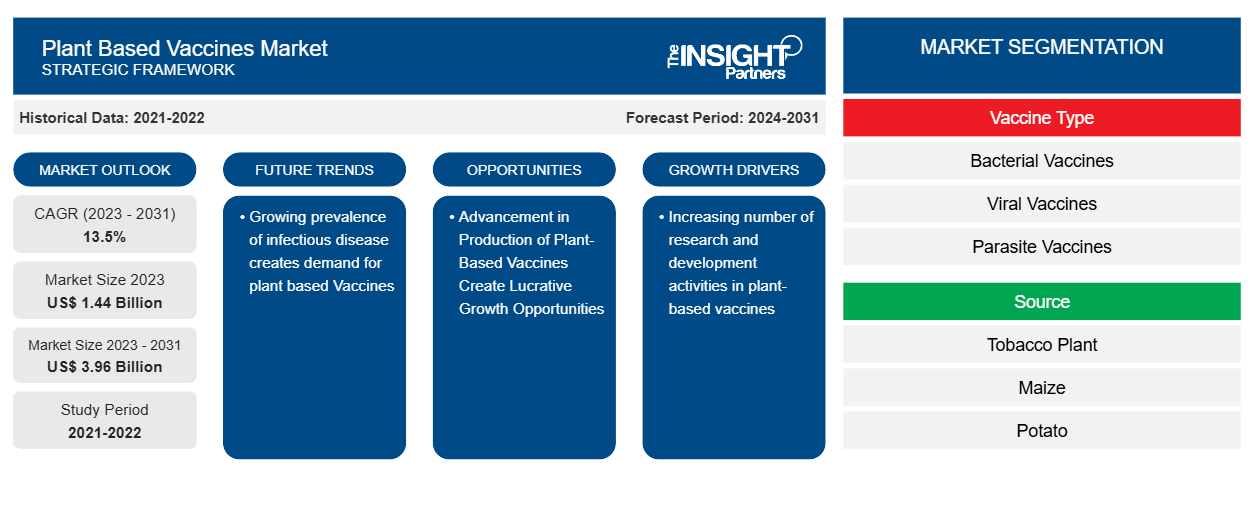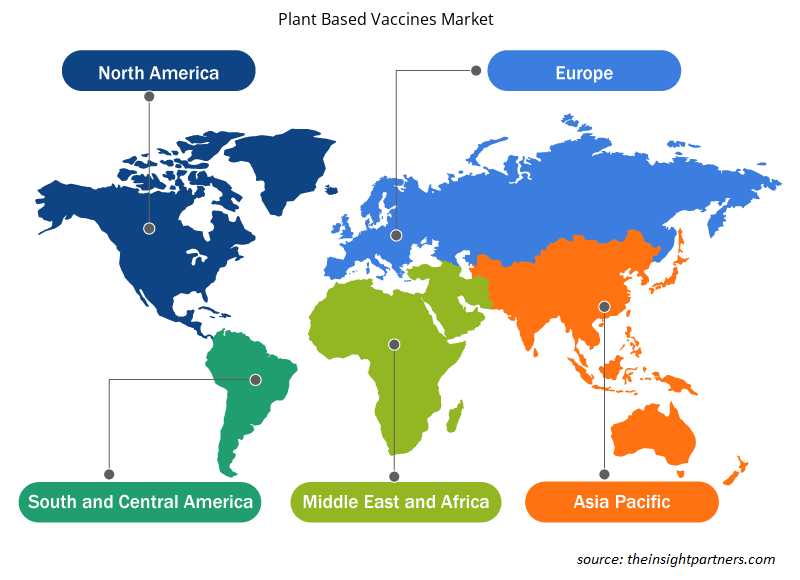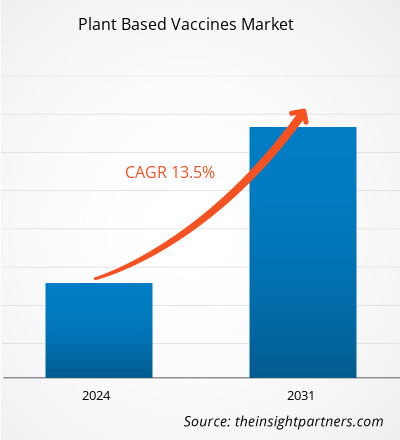The Plant based vaccines market size is projected to reach US$ 3.96 billion by 2031 from US$ 1.44 billion in 2023. The market is expected to register a CAGR of 13.5% during 2023–2031. Increasing product launches and product approvals are likely to remain key trends in the market.
Plant Based Vaccines Market Analysis
Increasing number of research and development activities in plant-based vaccines leads to product approval and launches along with growing prevalence of infectious disease is expected to drive the growth of plant-based vaccines market. Moreover, increasing fundings and technological advancement in research activities is expected to contribute the market growth. Moreover, advancement in product of plant-based vaccines such as Gene transfer by agrobacterium and transformation via a genetically engineered plant virus are two typical approaches for producing efficient vaccines is expected to create ample opportunities in the coming years.
Plant Based Vaccines Market Overview
Increasing number of research and development activities in plant-based vaccines leads to product approval and launches along with growing prevalence of infectious disease is expected to drive the growth of plant-based vaccines market. Moreover, North America accounts for the major market share in 2023 owing to the rising number of product launch, product approval along with the spur in research and development activities. Europe is second largest region after North America and Asia Pacific is expected to register significant growth rate owing to the rising development of research studies and the increasing prevalence of infectious diseases that have skyrocketed the need for the plant-based vaccines market. The countries such as Australia, India, and South Korea are estimated to serve various growth opportunities due to the rising development in the pharmaceutical sector are the factors contributing to the market growth.
Customize This Report To Suit Your Requirement
You will get customization on any report - free of charge - including parts of this report, or country-level analysis, Excel Data pack, as well as avail great offers and discounts for start-ups & universities
Plant Based Vaccines Market: Strategic Insights

- Get Top Key Market Trends of this report.This FREE sample will include data analysis, ranging from market trends to estimates and forecasts.
You will get customization on any report - free of charge - including parts of this report, or country-level analysis, Excel Data pack, as well as avail great offers and discounts for start-ups & universities
Plant Based Vaccines Market: Strategic Insights

- Get Top Key Market Trends of this report.This FREE sample will include data analysis, ranging from market trends to estimates and forecasts.
Plant Based Vaccines Market Drivers and Opportunities
Increasing Prevalence of Infectious Diseases to Favor Market
The rising prevalence of infectious diseases such as COVID-19, influenza, the common cold, tuberculosis (TB), hepatitis A and B is expected to flourish the demand for plant-based vaccines during the forecast period. On December 31, 2019, a COVID-19 case was first detected in Wuhan, China. On March 11, 2020, the World Health Organization proclaimed COVID-19 a pandemic. COVID-19's rapid proliferation is posing a challenge to the healthcare systems around the world. Hospitals and intensive care units (ICUs) in many nations are overburdened or on the verge of collapsing. As a result, the most efficient use of healthcare resources is required. With limited access to breathing equipment, skilled critical care employees, or protected patient monitoring systems, healthcare providers are compelled to treat extremely ill patients. The endeavor to keep COVID-19 patients from deteriorating and being admitted to the ICU is enormous. To slow the spread of the SARS-CoV-2 virus and prevent future outbreaks, the need for new diagnostics, treatments, and vaccinations is high.
Advancement in Production of Plant-Based Vaccines
Various approaches are used to integrate the desired genes encoding the antigen protein for a given illness into the genome of plant tissues in plant-based vaccination technology. Gene transfer by agrobacterium and transformation via a genetically engineered plant virus are two typical approaches for producing efficient vaccines. However, as science and technology have progressed, new approaches have been created to improve the efficiency of older technologies, including biolistic, electroporation, agroinfiltration, sonication, and polyethylene glycol treatment. When microbial genes are incorporated into the plant genome, they are translated into target pathogen protein antigens without harming the plant or losing their immunogenicity. The systemic and mucosal immune responses are involved in initiating host immunity against the infection. Some vaccinations, such as cholera, Lyme disease, anthrax, tetanus, plague, rotavirus, and canine parvovirus, are made using direct bombardment or biolistic methods. Tuberculosis, dengue, avian flu, and Ebola vaccines have been developed using indirect methods or Agrobacterium-mediated gene transfer.
Plant Based Vaccines Market Report Segmentation Analysis
Key segments that contributed to the derivation of the Plant based vaccines market analysis are vaccine type, source, and application.
- Based on vaccine type, the Plant based vaccines market is segmented bacterial vaccines, viral vaccines, parasite vaccines, plant-derived virus-like particles (VLPS), and others. The bacterial vaccines segment held the largest market share in 2023.
- By source, the market is segmented into tobacco plant, maize, potato, and others. The tobacco plant segment held the largest share of the market in 2023.
- In terms of application, the market is classified into influenza, zika virus, Ebola virus, poultry disease, Covid-19, and others. The influenza segment held a significant share of the market in 2023.
Plant Based Vaccines Market Share Analysis by Geography
The geographic scope of the Plant based vaccines market report is mainly divided into five regions: North America, Asia Pacific, Europe, Middle East & Africa, and South & Central America.
North America has dominated the market owing to the rising number of product launch along with the spur in research and development activities. However, during the forecast period the market is likely to get restrained by the factors such as challenges associated with the product approval, and the contamination and environmental risks for manufacturing plant-based vaccines. The US is the largest market for plant-based vaccines at a global level. The market's growth is attributed to the enormous number of R&D activities in the field of plant-based vaccines carried out in the country. The rising prevalence of infectious diseases in this region is anticipated to flourish the demand for plant-based vaccines. Infections such as viral hepatitis, influenza, and tuberculosis (TB) continue to be among the major causes of disease and death in the United States, resulting in significant spending on infection-related complications. Asia Pacific is anticipated to grow with the highest CAGR in the coming years.
Plant Based Vaccines Market Regional Insights
The regional trends and factors influencing the Plant Based Vaccines Market throughout the forecast period have been thoroughly explained by the analysts at Insight Partners. This section also discusses Plant Based Vaccines Market segments and geography across North America, Europe, Asia Pacific, Middle East and Africa, and South and Central America.

- Get the Regional Specific Data for Plant Based Vaccines Market
Plant Based Vaccines Market Report Scope
| Report Attribute | Details |
|---|---|
| Market size in 2023 | US$ 1.44 Billion |
| Market Size by 2031 | US$ 3.96 Billion |
| Global CAGR (2023 - 2031) | 13.5% |
| Historical Data | 2021-2022 |
| Forecast period | 2024-2031 |
| Segments Covered |
By Vaccine Type
|
| Regions and Countries Covered | North America
|
| Market leaders and key company profiles |
Plant Based Vaccines Market Players Density: Understanding Its Impact on Business Dynamics
The Plant Based Vaccines Market is growing rapidly, driven by increasing end-user demand due to factors such as evolving consumer preferences, technological advancements, and greater awareness of the product's benefits. As demand rises, businesses are expanding their offerings, innovating to meet consumer needs, and capitalizing on emerging trends, which further fuels market growth.
Market players density refers to the distribution of firms or companies operating within a particular market or industry. It indicates how many competitors (market players) are present in a given market space relative to its size or total market value.
Major Companies operating in the Plant Based Vaccines Market are:
- MEDICAGO INC.
- British American Tobacco p.l.c.
- ICON GENETICS GMBH
- CREATIVE BIOLABS, INC.
- iBio, Inc.
- LENIOBIO
Disclaimer: The companies listed above are not ranked in any particular order.

- Get the Plant Based Vaccines Market top key players overview
Plant Based Vaccines Market News and Recent Developments
The Plant based vaccines market is evaluated by gathering qualitative and quantitative data post primary and secondary research, which includes important corporate publications, association data, and databases. A few of the developments in the Plant based vaccines market are listed below:
- Medicago and GlaxoSmithKline (GSK) declared that Health Canada has granted approval for COVIFENZ, COVID-19 vaccine, (plant-based virus-like particles [VLP], recombinant, adjuvanted). This vaccine is indicated for active immunization to prevent coronavirus disease 2019 (COVID‑19) caused by severe acute respiratory syndrome coronavirus 2 (SARS‑CoV‑2) in individuals 18 to 64 years of age. (Source: GlaxoSmithKline, Press Release, February 2022)
- CEPI providing LenioBio with funding of up to US$2 million to provide preclinical proof-of-concept that a commercially available, plant-based, and cell-free technology can produce proteins to be used in vaccine trials for epidemic and pandemic threats in 20-40 days. Using LenioBio’s ALiCE technology, the ambition is to reduce the time required to manufacture vaccine proteins with “more traditional methods” like cell cultures. (Source: CEPI, Newsletter, May 2024)
Plant Based Vaccines Market Report Coverage and Deliverables
The “Plant Based Vaccines Market Size and Forecast (2021–2031)” report provides a detailed analysis of the market covering below areas:
- Plant based vaccines market size and forecast at global, regional, and country levels for all the key market segments covered under the scope
- Plant based vaccines market trends as well as market dynamics such as drivers, restraints, and key opportunities
- Detailed PEST/Porter’s Five Forces and SWOT analysis
- Plant based vaccines market analysis covering key market trends, global and regional framework, major players, regulations, and recent market developments
- Industry landscape and competition analysis covering market concentration, heat map analysis, prominent players, and recent developments for the Plant based vaccines market
- Detailed company profiles
Frequently Asked Questions
Which region dominated the Plant based vaccines market in 2023?
North America region dominated the Plant based vaccines market in 2023
What are the driving factors impacting the Plant based vaccines market?
Increasing number of research and development activities in plant-based vaccines leads to product approval and launches along with growing prevalence of infectious disease are the driving factors impacting the Plant based vaccines market
What are the future trends of the Plant based vaccines market?
Increasing product launches and product approvals are the future trends of the Plant based vaccines market
Which are the leading players operating in the Plant based vaccines market?
The leading players operating in the Plant based vaccines market includes MEDICAGO, INC., British American Tobacco p.l.c., ICON GENETICS GMBH, CREATIVE BIOLABS, INC., iBio, Inc., LENIOBIO, Lumen Bioscience, Inc., LEAF EXPRESSION SYSTEMS LTD., ZYUS LIFE SCIENCES INC., FRAUNHOFER CMB
What would be the estimated value of the Plant based vaccines market by 2031?
The estimated value of the Plant based vaccines market by 2031 is US$ 3.96 Bn
What is the expected CAGR of the Plant based vaccines market?
The expected CAGR of the Plant based vaccines market is 13.5%
- Historical Analysis (2 Years), Base Year, Forecast (7 Years) with CAGR
- PEST and SWOT Analysis
- Market Size Value / Volume - Global, Regional, Country
- Industry and Competitive Landscape
- Excel Dataset
Testimonials
I wish to appreciate your support and the professionalism you displayed in the course of attending to my request for information regarding to infectious disease IVD market in Nigeria. I appreciate your patience, your guidance, and the fact that you were willing to offer a discount, which eventually made it possible for us to close a deal. I look forward to engaging The Insight Partners in the future, all thanks to the impression you have created in me as a result of this first encounter.
DR CHIJIOKE ONYIA, MANAGING DIRECTOR, PineCrest Healthcare Ltd.The Insight Partners delivered insightful, well-structured market research with strong domain expertise. Their team was professional and responsive throughout. The user-friendly website made accessing industry reports seamless. We highly recommend them for reliable, high-quality research services
Yukihiko Adachi CEO, Deep Blue, LLC.Reason to Buy
- Informed Decision-Making
- Understanding Market Dynamics
- Competitive Analysis
- Customer Insights
- Market Forecasts
- Risk Mitigation
- Strategic Planning
- Investment Justification
- Identifying Emerging Markets
- Enhancing Marketing Strategies
- Boosting Operational Efficiency
- Tracking Industry Innovations
- Aligning with Regulatory Trends
Yes! We provide a free sample of the report, which includes Report Scope (Table of Contents), report structure, and selected insights to help you assess the value of the full report. Please click on the "Download Sample" button or contact us to receive your copy.
Absolutely — analyst assistance is part of the package. You can connect with our analyst post-purchase to clarify report insights, methodology or discuss how the findings apply to your business needs.
Once your order is successfully placed, you will receive a confirmation email along with your invoice.
• For published reports: You’ll receive access to the report within 4–6 working hours via a secured email sent to your email.
• For upcoming reports: Your order will be recorded as a pre-booking. Our team will share the estimated release date and keep you informed of any updates. As soon as the report is published, it will be delivered to your registered email.
We offer customization options to align the report with your specific objectives. Whether you need deeper insights into a particular region, industry segment, competitor analysis, or data cut, our research team can tailor the report accordingly. Please share your requirements with us, and we’ll be happy to provide a customized proposal or scope.
The report is available in either PDF format or as an Excel dataset, depending on the license you choose.
The PDF version provides the full analysis and visuals in a ready-to-read format. The Excel dataset includes all underlying data tables for easy manipulation and further analysis.
Please review the license options at checkout or contact us to confirm which formats are included with your purchase.
Our payment process is fully secure and PCI-DSS compliant.
We use trusted and encrypted payment gateways to ensure that all transactions are protected with industry-standard SSL encryption. Your payment details are never stored on our servers and are handled securely by certified third-party processors.
You can make your purchase with confidence, knowing your personal and financial information is safe with us.
Yes, we do offer special pricing for bulk purchases.
If you're interested in purchasing multiple reports, we’re happy to provide a customized bundle offer or volume-based discount tailored to your needs. Please contact our sales team with the list of reports you’re considering, and we’ll share a personalized quote.
Yes, absolutely.
Our team is available to help you make an informed decision. Whether you have questions about the report’s scope, methodology, customization options, or which license suits you best, we’re here to assist. Please reach out to us at sales@theinsightpartners.com, and one of our representatives will get in touch promptly.
Yes, a billing invoice will be automatically generated and sent to your registered email upon successful completion of your purchase.
If you need the invoice in a specific format or require additional details (such as company name, GST, or VAT information), feel free to contact us, and we’ll be happy to assist.
Yes, certainly.
If you encounter any difficulties accessing or receiving your report, our support team is ready to assist you. Simply reach out to us via email or live chat with your order information, and we’ll ensure the issue is resolved quickly so you can access your report without interruption.





















 Get Free Sample For
Get Free Sample For